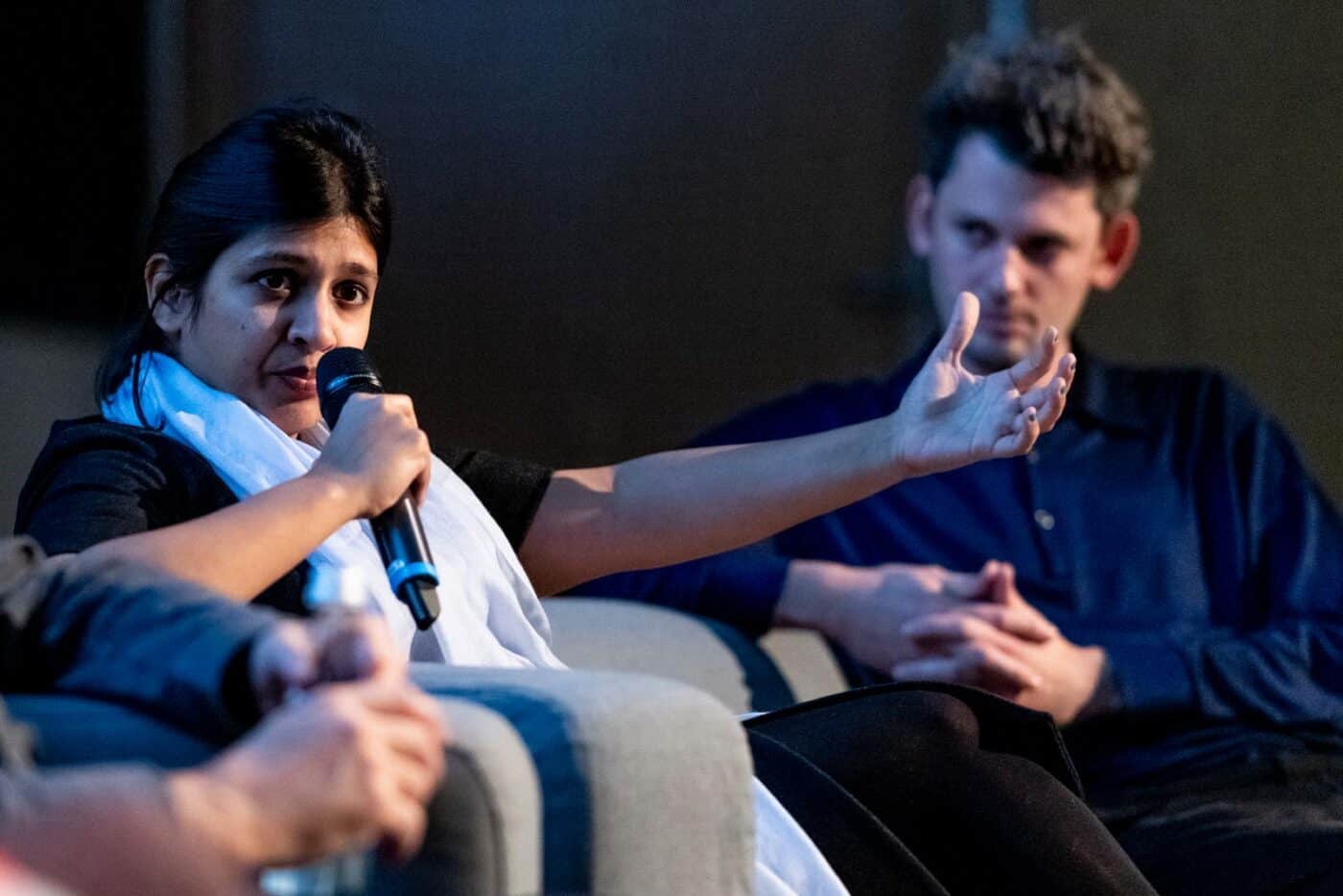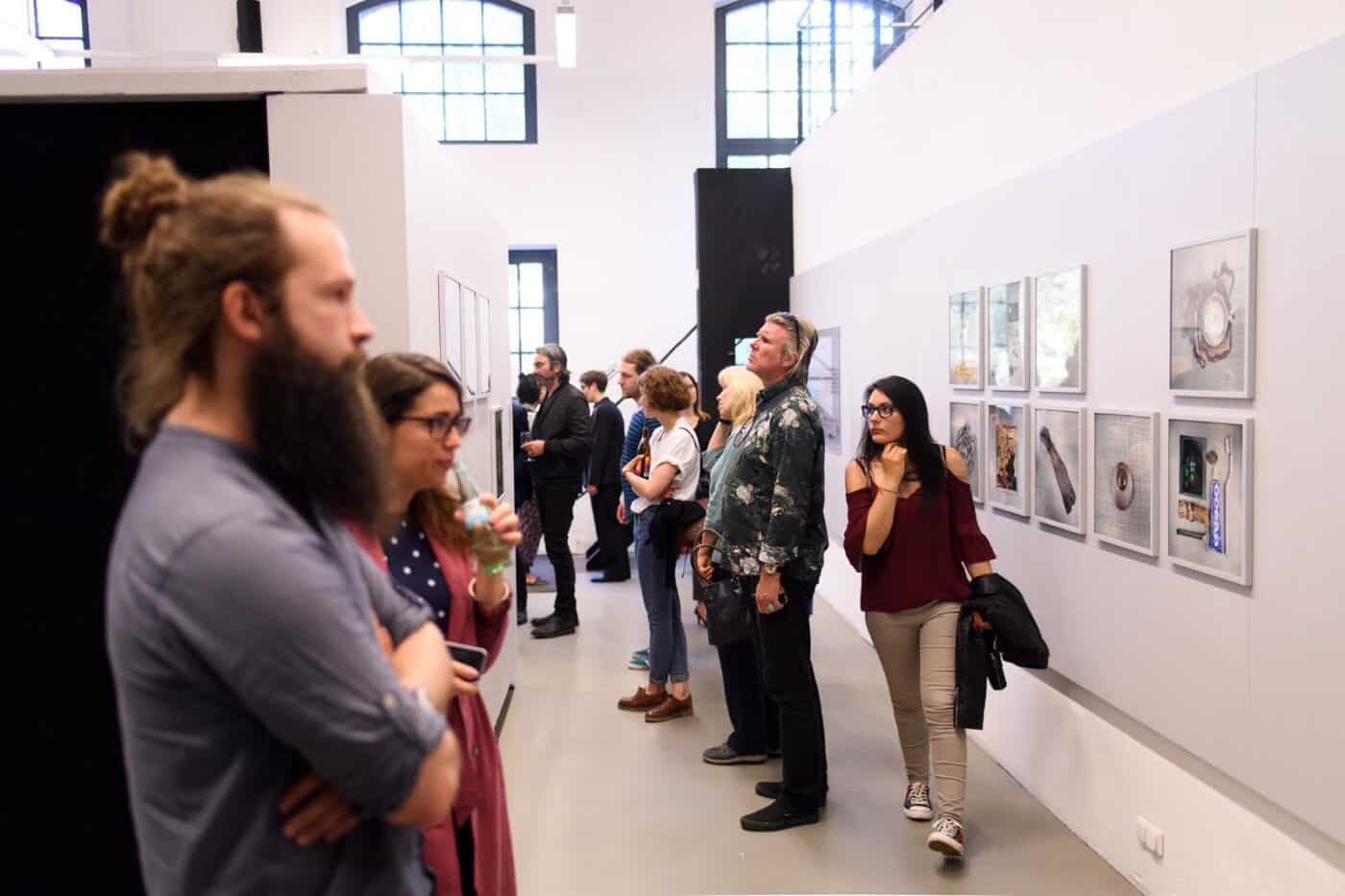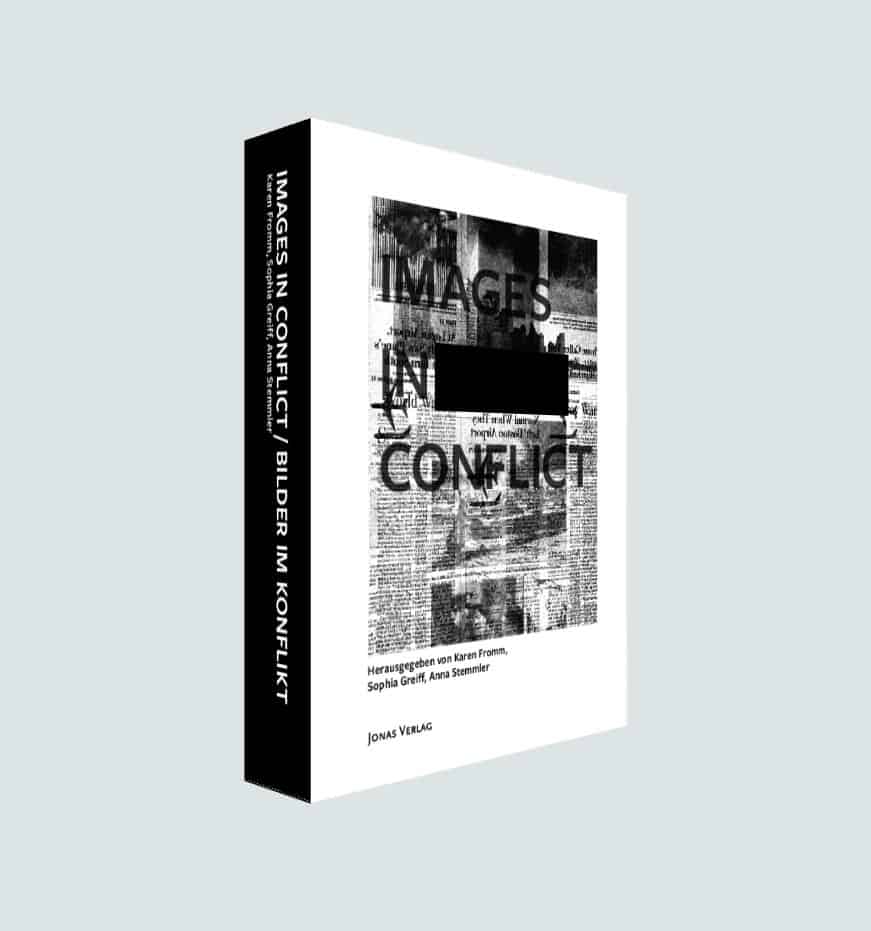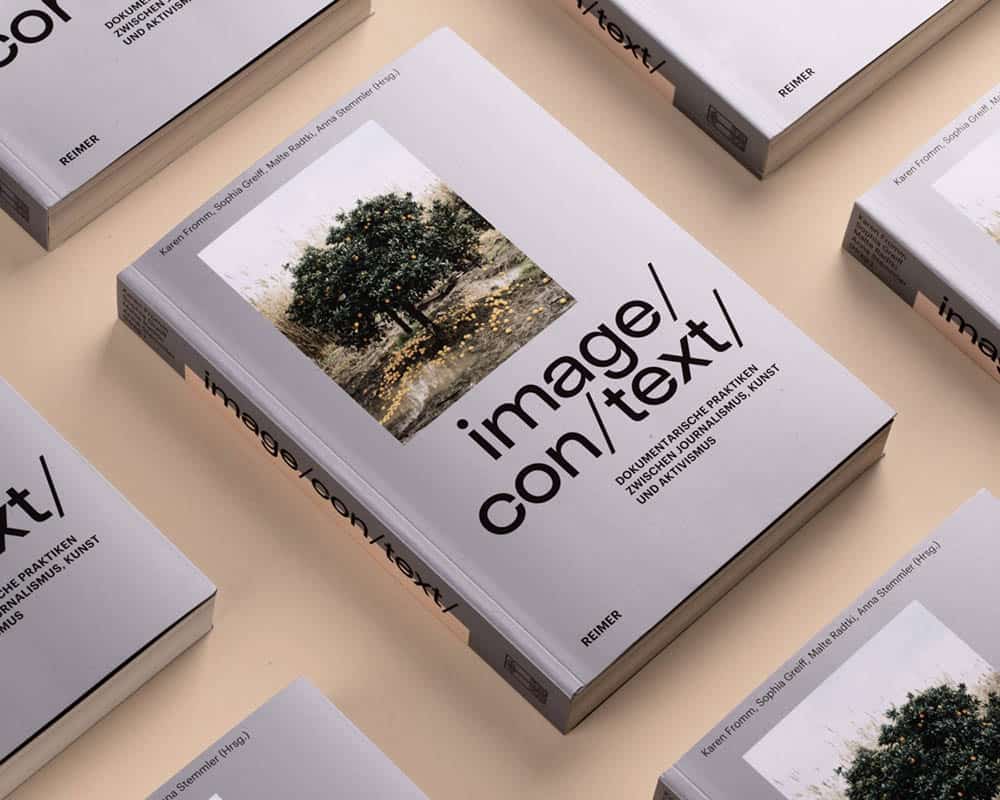Image competence in practice and theory. Current research projects in the study programme Visual Journalism and Documentary Photography
In addition to preparing students for concrete professional practice, we consider theoretical reflection on one’s own creative work to be an essential foundation for the professional use of visual media. We are convinced that given the changing image culture, sophisticated, self-reflective photography is needed more than ever. Therefore, a major focus of the training is on teaching comprehensive image competence – both practically and theoretically.
 Panel discussion with curator Alisha Sett and photographer Max Pinckers at the symposium "image/con/text". Photo: Michael Braunschädel
Panel discussion with curator Alisha Sett and photographer Max Pinckers at the symposium "image/con/text". Photo: Michael Braunschädel
[IMAGE MATTERS] A discourse platform that brings questions from photographic practice, discourse in the theory of image and photography as well as in visual and cultural studies into a dialogue.
With the aim of opening up significant new perspectives for both sides, [IMAGE MATTERS] brings together a network of national and international experts who take up and research current image and media discourses and take them beyond the boundaries of the individual disciplines to a broader public. With its focus on the interfaces between theory and practice, the transfer of scientific debates into society is a major concern of the discourse platform.
 “Images in Conflict” exhibition at GAF Hannover. Photo: Marvin Ibo Güngör
“Images in Conflict” exhibition at GAF Hannover. Photo: Marvin Ibo Güngör
A
[IMAGE MATTERS] organises workshops and symposia and develops publications. Two research projects have been carried out within the framework of [IMAGE MATTERS]. The first [IMAGE MATTERS] project explored the image discourses of war and ‘image wars’. The second project is dedicated to ‘image-text relations in journalistic publication contexts’. Essential components of both research projects were two symposia and subsequent publications. The projects were funded by third-party funds from Professorinnenprogramm II and VW Vorab.
 Publikation Images In Conflict
Publikation Images In Conflict
P
In 2018, the publication ‘Images in Conflict / Bilder im Konflikt’ was published. It follows from the conference and exhibition of the same name, which took place in May 2017 at Faculty III of Hannover University of Applied Sciences and Arts and GAF – Galerie für Fotografie. Against the backdrop of the relationship between conflicts and their medialisation, this volume is dedicated, over four chapters (‘Agents and Perspectives’, ‘Nothing but the Truth’, ‘Visibly Invisible’, ‘How to Make Images matter?’), to the central aspects of current visualisation strategies and image conflicts. In a dialogue between the practice of creating photographic images and discourses in visual studies, the focus is directed toward future perspectives in the field of photojournalism and documentary photography.
 Publikation image/con/text
Publikation image/con/text
Publikation Image/con/text
2020 is the second [IMAGE MATTERS] publication, ‘image/con/text. Documentary Practices between Journalism, Art and Activism’ was published. It follows on from the international symposium ‘image/con/text. Complementary Testimonies in Documentary Discourse’, which was held at Hannover University of Applied Sciences and Arts in the fall of 2019. The publication examines image/text relations in notable contemporary and historical projects, focussing particularly on the medium of the photobook, but also encompassing film, multimedia, comics, and the narrative forms of the archive. The documentary strategies examined bring together journalistic, artistic and activist positions, weaving fact and fiction to reveal the constellations of power in the process of representation. Photographic narrators are increasingly employing the possibilities of deliberately generated context, not least to expand the scope of the narratable.
With a variety of voices and practices,‘image/con/text. Documentary Practices between Journalism, Art and Activism’ adds to the so much-needed discourse on today’s documentary photography. During the symposium, which served as the groundwork for this publication, it became once more apparent how important it is to be aware of one’s perspective and position as a documentary photographer.
 Iris Sikking, Curator
Iris Sikking, Curator
Image Market – Business Trends. A research project on the development of the trade in rights to use images.
For many years, the media, in general, and picture journalism, in particular, have been undergoing a structural change for whose dimension and dynamics it is hard to find current or historical comparisons, either within the picture media or in other industries. As a result of digitisation, the handling of rights to use images is changing beyond recognition. Photographers are becoming multimedia content suppliers. Mono-media publishing is being replaced by trans-media content publishing.
Traditional picture agencies are disappearing for economic reasons, and new providers are entering the market and changing business models, working conditions, and picture languages. The changed production and publication conditions for images do not only mean a change to photojournalism in particular but of the image media as a whole, the overall social effects of which can only be speculated about at present.
Led by Prof. Lars Bauernschmitt, the research group ‘image market – business trends’ has been studying the development of the trade in rights to use images since 2018 and documenting how social, medial, legal and technical developments mutually influence each other, continuously change the image market and thus ultimately determine which images (from which source, with which image language and which image design) are published.
Changes in picture editing practices in digital newspaper journalism. A comparative study of local editors in Lower Saxony and the national press.
Considering the profound process of change in German newspaper journalism under the auspices of digitisation and a steady increase in the importance of visualisation, the research project looks at picture editorial structures and activities in German newspaper editorial offices in both the print and online sectors. The focus is on how professional roles and working practices specialised in the processing of photographic images have developed within newsrooms.
The central instruments of the study are editorial observations and expert interviews conducted at three high-quality national newspapers and three local newspapers in Lower Saxony, as well as an online survey of German newspaper publishers. In addition, dialogue with employers’ and journalists’ associations will be sought via regional expert discussions, and a science-practice transfer will be established. The three-year project is funded by the PRO*Niedersachsen programme. The project is managed by Dr. Felix Koltermann, who also initiated it.
Sophia Greiff Changing perspectives: alternative forms of narration and representation in contemporary photojournalism
Given the increasing flood of information and complexity in a fast-moving and mediatised world, a tendency towards alternative storytelling strategies can be observed in photojournalism, which question, reflect and challenge the boundaries of journalistic reporting.
This dissertation project uses photo books and multimedia web formats to investigate the extent to which the interweaving of different perspectives and parallel narratives, the conscious subjectivity and emphasis on or expansion of authorship, collaborations, or the inclusion of fictional elements can create more multilayered approaches and possibilities for the reception. In particular, the question will be explored whether and how photojournalism can make use of conceptual methods from the fields of art and literature to do justice to a diversity of viewing possibilities and to attain more profound levels of knowledge and understanding without losing credibility.
First supervisor: Prof. Dr. Steffen Siegel (Folkwang University of the Arts, Essen)
Second supervisor: Prof. Dr. Karen Fromm (Hannover University of Applied Sciences)
Anna Stemmler Undead images. The indirect processing of photojournalistic footage in fictional film since 9/11.
The starting point of the research project is the observation that traces of the photographic documents of the terrorist attacks on the World Trade Center in New York can be discovered in fictional films made since September 11, 2001. Documentary imagery or a documentary aesthetic seems to be gaining importance for fictional films.
However, the aspect of the documentary in the fictional – compared to studies on the authenticity of documentary film or the use of documentary strategies in the field of art – has so far remained underexposed in research. The research project will establish an exemplary iconography of documentary images and strategies in the feature film field based on several recent works. For this purpose, possible pre-images from the photojournalistic field are identified.
It is asked what the integration of photographic documents in feature films does to the contextual information of photojournalistic images; often, these can only be read as documents in connection with knowledge about their situation of origin. Even in the new context of fictional films, however, the migrated images retain their affective content, which can be activated via the collective image memory and is linked to traumatic events. This medial mediation is to be made legible as an attempt to process crisis-ridden events in the visual and subjected to a critical examination of its pictorial effects.
First supervisor: Prof. Dr. Susanne von Falkenhausen (Humboldt University Berlin)
Second supervisor: Prof. Dr. Karen Fromm (University of Applied Sciences Hannover)
Your contact partners will be happy to assist you with your personal concerns. However, due to the large number of enquiries, we ask you to first check our FAQ to see if your question may already have been answered.
Dean of Studies, Design and Media department
Programme representative
Application and admission procedure
Hochschule Hannover
Faculty III – Media, Information and Design
Expo Plaza 2
D-30539 Hanover






